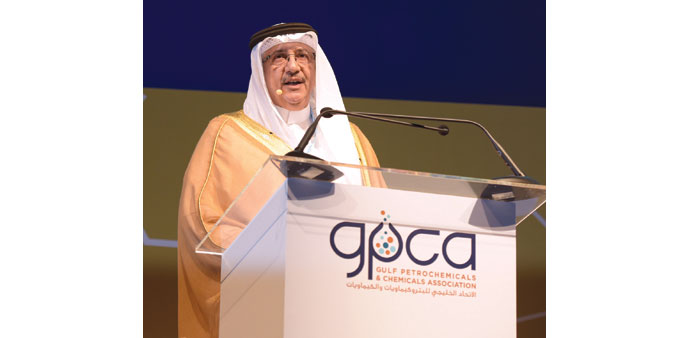The GCC petrochemicals industry produced 136.2mn tonnes as of 2014, earning $87.4bn in revenues, according to the Gulf Petrochemicals and Chemicals Association (GPCA).
Abdullatif Ahmad al-Othman, governor and chairman, board of directors, the Saudi Arabian General Investment Authority (SAGIA) said the GCC region currently accounted for 13% of the world’s petrochemical output by volume.
“Some 40 years ago, in the GCC region, we were in a very different place. Though the region was already one of the leading oil producers in the world, the industry had no method of capturing the associated gas by-product that would eventually be used in the basic chemicals we produce today,” al-Othman said at the GPCA Annual Forum.
“In Saudi Arabia, we created the master gas system to capture, treat, and process the gas through a very large and sophisticated gas network system of more than 4,000 kilometres in length, with production capacity of 9bn standard cubic feet every day. This transformed our industry and economy to include petrochemicals, resulting in a revolution over the past four decades.”
Al-Othman outlined Saudi Arabia’s ambitious development strategy, which includes goals to double employment, investment and economic growth in the next 10 years. The downstream sector is expected to play a major role in this vision, with the potential to create 200,000 direct jobs in this period and investment potential of more than $150bn, according to SAGIA estimates.
“Saudi Arabia is expected to be home to more than 50mn people in the next decade. We have the raw materials, an emerging logistics and transport hub and some of the most progressive investment laws in the world,” al-Othman said. “We have a strong business case for investors as we have the right market, right economy and right investment climate.”
Neil Chapman, president, ExxonMobil Chemical said, “The concept of a global petrochemicals market was born here in the Middle East more than 40 years ago. Today, the Middle East accounts for 80% of the world’s interregional chemical exports.”
However, recent developments in the global energy market prove that the evolution of chemicals industry can prove challenge.
“Change is the norm. At the first GPCA forum 10 years ago, no one anticipated that the US was about to emerge as a hotspot for chemicals investment. But today, we see the US pursuing a model similar to what the Middle East did decades ago, capitalising on domestic natural gas supplies by building capacity to serve overseas growth,” said Chapman.
“While the US has a long way to go before it might rival the Middle East, change in our industry isn’t always measured in years and decades. As recent twists in the oil market have made clear, the economics of petrochemicals can be transformed in a matter of months.” The long-term outlook remains positive, predicts Chapman. Global demand is expected to grow an average of 4% in the next decade, with two-thirds of this demand coming from non- OECD countries, especially China and India.

Al-Othman: Ambitious development strategy.
